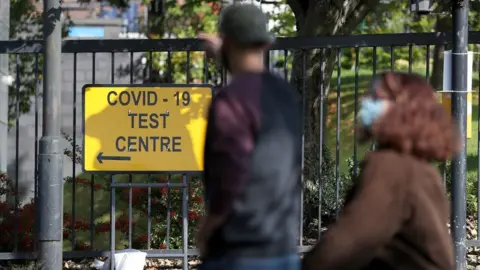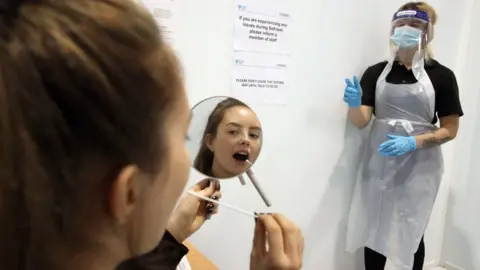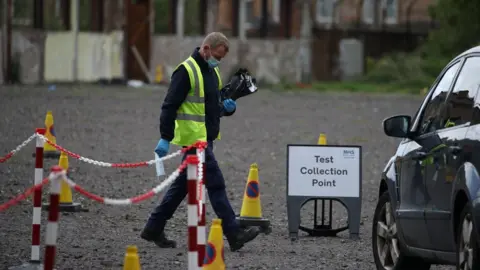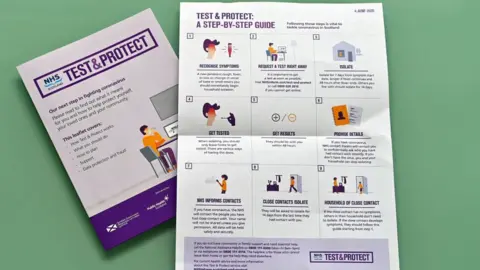Covid in Scotland: Contact tracing system 'straining' as cases surge
 PA Media
PA MediaThe huge increase in Covid-19 cases is straining Scotland's contact tracing system but it is "not collapsing", the national clinical director has said.
Figures from Public Health Scotland suggest it is now taking longer to contact infectious people and to track down their close contacts.
Prof Jason Leitch said "times of course stretch when numbers get big".
But he said the country's contact tracing staff were still hitting international targets.
A total of 4,234 new Covid cases were reported on Thursday, the latest in a series of new record highs in recent days.
Figures for last week showed that just 29% of people who tested positive had spoken to a contact tracer within 24 hours of being logged in the Test and Protect system - by far the lowest on record.
Opposition parties have called for more resources to be given to the Test and Protect system, warning that it was "reaching breaking point" and "buckling under the pressure".
 Getty Images
Getty ImagesAsked about this on the BBC's Good Morning Scotland programme, Prof Leitch said: "It's not collapsing. Not by any means.
"In fact there are thousands of my colleagues around the country today doing contact tracing and talking to positive cases and doing a fantastic job.
"But you can't have 4,000 cases without it straining. That's a lot."
Prof Leitch accepted that taking longer to conduct interviews with people who have tested positive "potentially does lead to a bigger spread of the virus".
He added: "If you know you have been in touch with a positive case then use your common sense and be careful.
"Contact tracing is still getting in touch with people inside the recommended World Health Organisation time, but those times of course stretch when the numbers get big."
How does contact tracing work?
 PA Media
PA MediaAfter someone has tested positive, their case is logged on the Test and Protect system and a contact tracer conducts a telephone interview to establish where they have been and who they have been in close contact with.
These contacts - people who the "index case" has been in close physical proximity to for long enough to potentially infect them - are then told to isolate and book a test of their own.
The idea is to reduce the risk of these close contacts passing on the virus to more and more people, breaking the chains of transmission.
This means it needs to happen quickly, to reduce the amount of time potentially infectious people are out and about without knowing they could be spreading the virus.
How is it going?

The latest set of figures from Public Health Scotland suggest that the system is coming under increasing strain due to the record high level of new infections.
They are now being presented with more cases to deal with per day than they were in an entire week at the end of May.
The data - for the period running from 21 to 25 June - shows that 29.2% of people who tested positive had spoken to a contact tracer within 24 hours of being logged in the Test and Protect system.
This was down from 49.5% the previous week, and is by some distance the lowest percentage ever recorded by PHS - even at the peak of the "second wave" in January, it did not fall below 75%.

In early April - when there were far fewer infections and therefore index cases to interview - the figure stood at 95.6%.
Tracing is also taking a bit longer to complete, with just 20% being "closed" in the case management system - meaning the final contact interview has taken place - within 24 hours.
This is again the lowest percentage ever recorded by PHS. In April, 80% of cases were concluded within a day of being opened in the system.
Fewer cases being concluded quickly means more are taking longer, with the percentage of contact tracing exercises taking more than 48 hours to complete rising to 43% - its highest level since October 2020.
What is being done?
 Getty Images
Getty ImagesEfforts are being made to streamline the system, so contact tracers can focus on getting through the ever-mounting pile of interviews with new cases.
When case numbers were lower, they also tried to actually speak to close contacts by telephone, but Public Health Scotland says it has now switched to contacting them via text message as a default to make sure information and advice can be circulated as quickly as possible.
Staff have also switched to sending text messages to travellers arriving from "red list" countries, who are required to quarantine, rather than calling them, and have dropped all "secondary" tracing - where in some cases, the contacts of contacts were notified.
During the interviews themselves, teams have "looked to increase capacity by prioritising the information collected during each call" - essentially meaning less questions are asked about events, settings and travel.
Are targets being met?
While Covid patients are waiting longer to be interviewed and fewer cases are being dealt with swiftly, the system's overall performance is still within the targets set for it by the government.
First Minister Nicola Sturgeon says the aim is for 80% of new cases to have their close contacts traced and in quarantine within 72 hours of a positive test result.
The latest PHS figures had 85.9% of cases being complete within three days of being registered with Test and Protect.
This is down from 88.2% the previous week and 99.1% back in April, but still comfortably within the target range.
Ms Sturgeon cited the World Health Organisation as backing the 80% target.
However guidance published by the WHO online appears to suggest that its goal is for 80% of the close contacts of each index case to be in quarantine within three days of them developing symptoms.
This difference in definitions makes it difficult to tell if Scotland is living up to international standards or not - the most recent PHS figures suggested that 23.5% of Scots had a wait of more than 72 hours between taking a test and being interviewed by a contact tracer.
What are opposition politicians saying?
Opposition parties have called for Test and Protect to be given greater resources.
Scottish Conservative health spokeswoman Annie Wells said the surge in cases meant that it was "imperative people are contacted as quickly as possible to stop any further spread of the virus".
She added: "The system is clearly completely overwhelmed with the spike in cases in recent weeks and SNP ministers must get on top of this situation immediately.
"The public would understandably be angry if continued failures within the Test and Protect system meant any potential delays to the further easing of restrictions."
The Scottish Lib Dems say the system is "buckling under pressure", with MP Wendy Chamberlain saying: "The system needs urgent reinforcements - we need more tracers to be able to go and hunt down the virus because every minute counts."
And Scottish Labour's deputy leader Jackie Baillie said "mismanagement" of the system was "helping the virus to spread".
She said: "Test and Protect is collapsing under the pressure as cases spiral, and things will only get worse if we don't fix this.
"Minsters are cutting corners all over the place to try and keep the system afloat, but that will only make things worse."


Have you been messaged or called by Test and Protect and told someone with Covid has been in contact with you? Did you expect to be approached by Test and Protect (because a close contact of yours had the virus) but were not?
You can get in touch with BBC Scotland on the phone messaging service, WhatsApp.
To start using the app, simply download WhatsApp on to your smartphone free from the internet.
Then add our WhatsApp number +44 7902 704679 to your phone's contact list.
Please make sure you read our terms of use and privacy policy.
